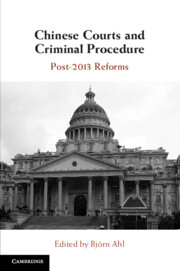Book contents
- Chinese Courts and Criminal Procedure
- Chinese Courts and Criminal Procedure
- Copyright page
- Contents
- Figures and Tables
- Contributors
- Acknowledgements
- Abbreviations
- 1 Post-2013 Reforms of the Chinese Courts and Criminal Procedure
- 2 The Meandering Path of Judicial Reform with Chinese Characteristics
- 3 Dimensions and Contradictions of Judicial Reforms in China
- 4 How the Supreme People’s Court Drafts Criminal Procedure Judicial Interpretations
- 5 Judicial (Dis)Empowerment and Centralisation Efforts
- 6 A New Model of Habeas Corpus in China? Procuratorial Necessity Examination of Pretrial Custody
- 7 Live Witness Testimony in the Chinese Criminal Courts
- 8 Blood Money and Negotiated Justice in China
- 9 Performance Evaluation in the Context of Criminal Justice Reform
- 10 From Populism to Professionalism
- Index
10 - From Populism to Professionalism
The Media and Criminal Justice in China
Published online by Cambridge University Press: 25 June 2021
- Chinese Courts and Criminal Procedure
- Chinese Courts and Criminal Procedure
- Copyright page
- Contents
- Figures and Tables
- Contributors
- Acknowledgements
- Abbreviations
- 1 Post-2013 Reforms of the Chinese Courts and Criminal Procedure
- 2 The Meandering Path of Judicial Reform with Chinese Characteristics
- 3 Dimensions and Contradictions of Judicial Reforms in China
- 4 How the Supreme People’s Court Drafts Criminal Procedure Judicial Interpretations
- 5 Judicial (Dis)Empowerment and Centralisation Efforts
- 6 A New Model of Habeas Corpus in China? Procuratorial Necessity Examination of Pretrial Custody
- 7 Live Witness Testimony in the Chinese Criminal Courts
- 8 Blood Money and Negotiated Justice in China
- 9 Performance Evaluation in the Context of Criminal Justice Reform
- 10 From Populism to Professionalism
- Index
Summary
This chapter argues that the courts’ ability to shape the messaging on specific cases by engaging directly with the public through, inter alia, social media, live streams of court proceedings and open access to a fairly comprehensive database of judicial decisions has enhanced the judicial system’s responsiveness and strengthened its potential resilience against populist demands without curtailing its answerability to public criticism and mistrust. Furthermore, the chapter contends that this professionalising of yet another aspect of the Chinese judicial system has increased public trust in the courts without necessarily challenging the rule of law by pandering to populist pressure. At the same time, shielding the courts from public opinion on matters of justice and legal consciousness may nevertheless significantly impede legal innovation. As exemplified by the elevation of the Yu Huan decision to a Supreme People’s Court leading case, resisting public pressure may also mean that the courts rely on a specific interpretation of the law that may reflect the well-established consensus in judicial practice but is, from the perspective of legal academics, also a desideratum for urgent legal reform. The courts may therefore hide behind the security of a unitary application of law, thereby significantly impeding legal innovation.
- Type
- Chapter
- Information
- Chinese Courts and Criminal ProcedurePost-2013 Reforms, pp. 258 - 284Publisher: Cambridge University PressPrint publication year: 2021
- 1
- Cited by



